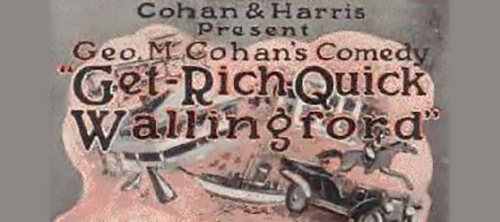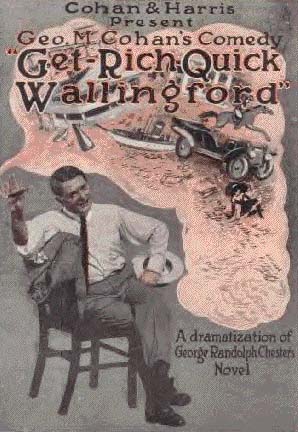Get-Rich-Quick Wallingford
Théâtre (1910) - Top

"Get-Rich-Quick Wallingford" est basé sur un roman éponyme de George Randolph Chester, à qui Cohan a acheté les droits d'adaptation à la scène. C’était la première fois que Cohan avait adapté le travail d’un autre auteur, et un roman. Cohan était également heureux parce que, "J’ai eu la satisfaction d’avoir vu ma pièce se jouer un an à Broadway alors qu'il ne s'agissait pas d'un musical."
L’escroc J. Rufus Wallingford et son associé Blackie Daw viennent dans une petite ville et escroquent divers habitants. Cependant, leur grand plan est un échec et leurs vrais visages sont dévoilés. Mais lorsque le chef d’entreprise qui a été escroqué obtient de grands succès suite aux conseils de Wallingford, tout est pardonné et Wallingford est embauché comme cadre supérieur. Son raisonnement : « [...] le développement logique de la méthode américaine à réussir peu importe comment. »
1 Get-Rich-Quick Wallingford peut-être considéré comme un Top musical
Aucun dossier informatif complémentaire concernant Get-Rich-Quick Wallingford
Aucun dossier informatif complémentaire concernant Get-Rich-Quick Wallingford

Version 1
Get-Rich-Quick Wallingford (1910-09-Gaiety Theatre-Broadway)
Type de série: OriginalThéâtre: Gaiety Theatre (Broadway - Etats-Unis) Durée : Nombre : 424 représentationsPremière Preview : 19 September 1910
Première: 19 September 1910
Dernière: InconnuMise en scène : George M. Cohan • Chorégraphie : Producteur : George M. Cohan • Sam H. Harris • Star(s) : Avec: Ida Lee Caston (Gertrude Dempsey), Spencer Charters (Tom Donahue), Edward Ellis (Horace Daw), Daniel Gold (Yosi), Grace GoodallHale Hamilton (J. Rufus Wallingford), Fletcher Harvey (E.B. Lott), George K. Henery (Judge Kenneth B. Lampton), Horace James (Timothy Battles), J.C. Marlowe ("Andy" Dempsey), Frederick Maynard (Richard Welles), Grant Mitchell (Edward Lamb), Scamp Montgomery (Abe Gunther), Russell Pincus (Willie), Purnell Pratt (Clint Harkins), Frances Ring (Fannie Jasper), Frederick Seaton (G.W. Battles), Daniel Sullivan (Henry Quigg), Marie Taylor (Mrs. "Andy" Dempsey), Fay Wallace (Dorothy Welles)Commentaires : Gaiety Theatre: 19 sept 1910 - ???
George M. Cohan's Theatre - 13 fév 1911 - ???Presse : "An Ibsenish foreboding that something terrible was going to happen has been hanging over us. It has happened. Mr. George M. Cohan has condemned the debasing influence of the chorus girl shows and the unfumigated French farce. If this pronouncement had come from any other arbiter elegantiarum than Mr. Cohan we might have remained skeptical. Even Mr. Abraham L. Erlanger might have said them words and we should not have been driven to weeping on shoulders. But when the modest creator of the Star-spangled drama, the inculcator of the chewing gum standard of good taste in countless thousands of young American bosoms, turns himself loose to inveigh against the demoralizing tendency of the alluringly undraped chorus young person and the subtle suggestion of the French farce with naughtiness set forth as the stylish thing to practice, it must be admitted that the truth is out. If it has penetrated as far as Mr. George M. Cohan there is no need of further concealment. It is possible that Mr. Cohan's friend, Mr. Erlanger, had some suspicion of the fact when "The Girl With The Whooping Cough" was driven by the police from his New York Theater, but Mr. Cohan's announcement in print that he has actually discovered that there is too much appeal to the lower instincts in American stage entertainment at reputable theaters shows that the fact has become pretty generally known.
But now that Mr. Cohan has discovered it, what is he going to do about it? Is he going to prevail on Mr. Erlanger and his other managerial friends to close their stages to the chorus girls and the French farce? Is he going to drive out ragtime as the only kind of music the big American public cares to hear? He should remember that persons who care for nothing but ragtime, farce and chorus girls are the ones who in the aggregate spend the most money on theaters. Of all persons on earth Mr. Cohan is just the one to raise the standard of public taste, and it would be very interesting to know just how he
would set about to do it." (James Metcalfe, Life Magazine, 1910)
Pas encore de video disponible pour ce spectacle